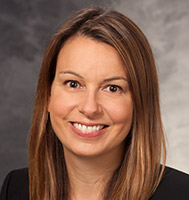Pediatric Cardiology
|
Pediatric Cardiology - PEDIAT 943 |
Welcome to Pediatric Cardiology!We are so happy that you are choosing to learn more about the Pediatric Cardiology elective! During your time with us, you should learn to:
|
Course Director Division Coordinator
|
Where to go on the first day:
- On your first day, come to the team room AFCH 2335 in the cow hallway.
- Morning clinic typically starts at 8:30 am
What to bring:
- ID badge
- Stethoscope
- Any favorite references (see suggestions below)
People to Know
- General Rotation Questions: Tori Benson, tlbenson3@wisc.edu
- Pediatric Cardiology Specific Questions: cardiology administrator, Haley Stappert, stappert@wisc.edu or attending cardiologist, Margaret Greco mmgreco@wisc.edu
- Inpatient Team: Karie Canada NP pager 4616, kcanada@uwhealth.org; Bridget Lucas, pager 5401, blucas2@uwhealth.org; and cardiology attending of the week
- The rest of the cardiology team you will meet during your rotation.
Expectations
- Make a list of 3-5 personal educational goals at the beginning of the rotation and plan of how you’re going to accomplish them. If you aren’t sure, please ask!
- Share your educational goals with the pediatric cardiology inpatient and outpatient clinic providers to ensure your goals are met.
- Attend inpatient pediatric cardiology rounds and see inpatients with the team in the AM. Rounds generally start at 8:30, but contact the pediatric cardiology inpatient NPs at 8am on the first day of your rotation to confirm.
- Attend outpatient pediatric cardiology clinic in the PM. Students should read up on patients prior to seeing them in clinic. Discuss with the clinic provider goals and expectations that day of clinic as some clinics have varying flow and note template requirements.
- See an electrophysiology (EP) and cardiac cath case during their rotation. The schedule varies with need so discuss availability at the beginning of the rotation to determine the schedule.
- Attend cardiology conferences: surgery conference, educational conference, CVICU conference, other variable lectures (information for each conference should be sent at least 1-2 days prior to the meeting from the cardiology administrators).
- Ask questions, get involved, learn and have fun!
Educational Opportunities
See https://pediatrics.wisc.edu for current Grand Rounds schedule
- Inpatient Rounds/Consults (Morning)
- Page Inpatient Pediatric Cardiology NPs at 8AM on the first day of your rotation to determine meeting time and location (check paging to determine which NP is available)
- Rounds generally start at 8:30 AM
- Follow at least 1 or 2 patients to know all the specific details of their hospital course (cardiac diagnosis, surgeries, trends in vitals, lab results, clinical course, etc)
- Review telemetry (we will show you how to do this)
- Review medications on your patients (know cardiac side effects, mechanism of action, potential side effects, etc)
- May present to cardiology attending (currently students do not present during rounds)
- Examine inpatient pediatric cardiology patients
- Participate in consults as available
- Clinic (Afternoon)
- See patients in clinic, present to provider
- For most up to date schedule, check HealthLink (Dept = “AFCH CARDIO”)
- Make sure to read about your patients prior to seeing them
- Discuss clinic goals and expectations that day of clinic as some have varying flow and note templates
- Other Clinical Opportunities
- Cath/EP
- ECG
- Exercise stress test
- Echo/Fetal Echo
- Conferences
- Cardiology Echo Imaging Conference (Tuesdays from 2-3 PM )
- Cardiology PAC Conference (Tuesdays from 3-4 PM)
- Congenital cardiology education conference (Wed AM)
- CVICU conference (Thurs PM)
- Cardiothoracic surgical conference (Fri AM)
- Pediatric Grand Rounds (Thurs AM)
- Resident PEARL conference (Fri PM)
- Lectures
- Variable scheduled cardiology topics
- Other ad hoc lectures during outpatient and inpatient experiences
Educational Resources
- MedHub, pediatrics residency website – useful articles and schedule of educational sessions
- URL: https://uwhealth.medhub.com Links to an external site.
- Username: uwpeds
- Password: 4medstudent
- Home page > “Resources/Documents” > “Curriculum Documents” > Cardiology
- There are some textbooks available in the team room at AFCH.
- A nice textbook if you are looking for your own general pediatric cardiology is “Park’s Pediatric Cardiology for Practitioners” by Myung Park.
Feedback
- Mid-rotation feedback during week 3 of rotation (arranged by cardiology administrator)
- End of rotation feedback during last week of rotation (arranged by cardiology administrator)
